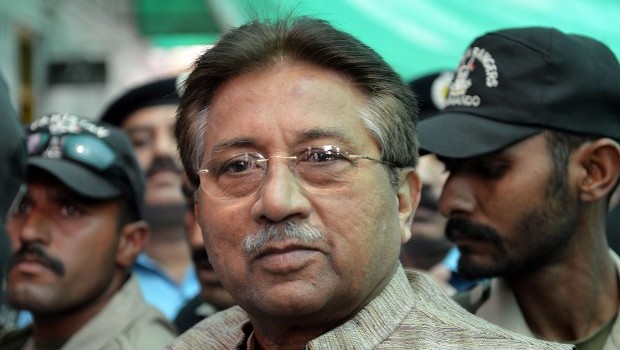
In this photograph taken on April 20, 2013, former Pakistani president Pervez Musharraf (C) is escorted by soldiers as he arrives at an anti-terrorism court in Islamabad. Source: AFP Photo/Aamir Qureshi
Islamabad, AP—Pakistan’s prime minister said Monday that the government plans to put the military ruler who ousted him in a coup over a decade ago on trial for treason, setting up a possible clash with the country’s powerful army.
But the government stopped short of declaring officially that it was filing charges against Pervez Musharraf, saying it would first consult with other political parties.
Prime Minister Nawaz Sharif spoke in parliament as the Supreme Court held a hearing on a possible treason case against Musharraf. The former military ruler can only be tried for treason if the federal government presses charges against him.
Sharif said the government agrees with the Supreme Court’s decision that Musharraf committed treason under Article 6 of the constitution when he declared a state of emergency in 2007 and suspended the constitution.
“The prime minister is under oath to protect, preserve and defend the constitution and it is implicit in his oath that his government ensures that persons guilty of acts under Article 6 are brought to justice,” Sharif said in parliament.
The premier was reading from a statement that was submitted to the Supreme Court by Attorney General Munir Malik on Monday. The statement did not mention Musharraf’s ouster of Sharif in a coup in 1999 when he was serving as army chief, perhaps because the move was retroactively approved by the Supreme Court and parliament at the time.
“Musharraf has to answer for all his deeds in court,” Sharif said in a separate part of the speech.
Musharraf would be the first military ruler tried for treason in a country that has experienced three military coups in its nearly 66-year history.
Sharif said the government would consult with other political parties on bringing Musharraf to trial, leaving open the possibility that it could still choose to abandon the case if it faced opposition.
“The federal government will proceed in accordance with the law and also take political forces into confidence through a consultative process so that the collective will and wisdom of the people of Pakistan is duly reflected in further process in this behalf.”
Senior lawmakers from the two main opposition parties, the Pakistan People’s Party and Pakistan Tehreek-e-Insaf, said they supported the government’s plan to try Musharraf for treason.
“If we are going to strengthen democracy in this country and establish democratic norms, the only way is to follow the constitution and abide by the law,” said Pakistan Tehreek-e-Insaf lawmaker Shah Mahmood Qureshi.
Musharraf, who is currently under house arrest in connection with a separate case, could face the death penalty or life in prison if he is convicted of treason. But some analysts doubt the army, which is considered the country’s most powerful institution, would allow that to happen and could intervene to prevent it. Musharraf has maintained his innocence.
Musharraf returned to Pakistan in March after years in self-imposed exile, with the hope of running in the national election that was held in May. But he was disqualified from participating in the vote because of his actions while in power and has spent most of his time battling legal cases. The government has barred him from leaving the country while the cases are in progress.
The caretaker government that ruled the country in the run-up to the election declined to press treason charges against Musharraf, telling the Supreme Court that the issue was outside its mandate.
Supreme Court judges quizzed the attorney general on Monday about the government’s specific plans to bring charges against Musharraf. Malik requested 30 days to prepare a plan. The judges ordered him to appear before the court again on Thursday to provide an update.
Also Monday, gunmen on motorcycles killed a mid-ranking police officer and his driver in the northwest city of Peshawar, said police official Mohammed Ibrahim Khan. Amanullah Khan, a deputy superintendent, was in charge of the traffic police in Peshawar.
No one has claimed responsibility, but suspicion will likely fall on the Pakistani Taliban.
